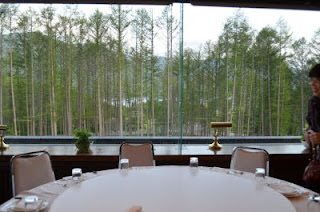Today, I discovered another reason to hate katakana.
Katakana (カタカナ) is the Japanese alphabet for loan words, words that come from other languages. banana becomes ba-na-na (バナナ), pineapple becomes pine (パイン). Sometimes this makes learning Japanese really easy, because it's just a very broken up way of pronouncing English. On the other hand, it makes my students believe that we will understand them when they speak Katakana English to us (not true).
But, other times katakana words come from other languages. Stapler, for example becomes ホチキス Ho-chi-ki-su, from the name of the guy who invented it. Part time job becomes アルバイト, a-ru-ba-i-to, from the German word for it.
Even other times, Japanese is put into katakana, because it looks cool. I think these are the most difficult words, because I sit there sounding them out trying to figure out what English they could be and they're not (I'm as bad as all of my kids, I expect katakana to always be English words). The Japanese words are the hardest, because they're not usually in the dictionary like that.
So today, my students are supposed to be practicing "Do you . . ." sentences. I look over one's shoulder and he's written "Do you play fagot?" I ask him what he means (assuming it's a mis-translation) and he says it's a katakana word and does the motion to show me it's an instrument. We can't figure it out and even the teacher is thinking I might be crazy for not knowing this word, but I know that this word cannot be what he means. I'm not completely sure of it's meaning in English, but I know it's a pretty bad insult.
After class, my teacher pulls out her dictionary and looks up what he means, bassoon, it comes from the word in German. She also looks up fagot and is surprised to find that it's such a terrible word in English.
Yet another reason why I dislike katakana.








 d
d
































